
About Us
Established in 2008, the Department of Electronics and Communication Engineering (ECE) offers an undergraduate program (BE-ECE) that provides students with a comprehensive foundation in electronics and communication technologies. Our curriculum covers key areas such as Telecommunication Networks, Embedded Systems, Signal and Image Processing, and VLSI Design, ensuring that students are well-prepared to meet the demands of the dynamic tech industry.
Our program emphasizes both theoretical knowledge and practical skills, preparing graduates for a wide range of career opportunities in fields like telecommunications, embedded systems, semiconductor design, and software development. Students are equipped with the tools and expertise needed to achieve excellence, whether in industry roles or advanced studies.
The department is known for its strong placement record, with graduates consistently securing positions in leading companies. We are committed to nurturing innovation, fostering technical excellence, and developing future leaders in the field of electronics and communication engineering.
Intake:60
Vision & Mission
VISION
- Produce competent Electronics and Communication Engineering professionals with scientific temper, values, ethics, team spirit and capabilities to face new challenges.
MISSION
- Provide conducing learning environment with state-of-the-art infrastructure facilities, laboratories and teaching learning systems.
- Produce skilled Electronics and/or Communication Engineers with skills towards employability, leadership, communication skills with social responsibilities and ethical values
- Inculcate Professional skills to function as proficient engineers and designers capable of building sustainable equipment/systems and infrastructure for the society.
- Promote research and development activities in the rapidly changing technologies related to Electronics and Communication Engineering and allied domains.
Program Educational Objectives
PEO1:Successful career: To enable graduates have a successful career in academia or industries associated with Electronics and Communication Engineering, or as entrepreneurs.
PEO2:Foundational concepts: To provide students with strong foundational concepts and also advanced techniques and tools in order to enable them to build solutions or systems of varying complexity.
PEO3:Analyze Methodology: To prepare students to critically analyze existing literature in an area of specialization and ethically develop innovative and research oriented methodologies to solve the problems identified.
Programme Outcomes
PO-1:Engineering knowledge: Apply the knowledge of mathematics, science, engineering fundamentals, and an engineering specialization to the solution of complex engineering problems.
PO-2.Problem analysis: Identify, formulate, review research literature, and analyze complex engineering problems reaching substantiated conclusions using first principles of mathematics, natural sciences, and engineering sciences.
PO-3: Design/development of solutions: Design solutions for complex engineering problems and design system components or processes that meet the specified needs with appropriate consideration for the public health and safety, and the cultural, societal, and environmental considerations.
PO-4: Conduct investigations of complex problems: Use research-based knowledge and research methods including design of experiments, analysis and interpretation of data, and synthesis of the information to provide valid conclusions.
PO-5: Modern tool usage: Create, select, and apply appropriate techniques, resources, and modern engineering and IT tools including prediction and modeling to complex engineering activities with an understanding of the limitations.
PO-6: The engineer and society: Apply reasoning informed by the contextual knowledge to assess societal, health, safety, legal and cultural issues and the consequent responsibilities relevant to the professional engineering practice.
PO-7: Environment and sustainability: Understand the impact of the professional engineering solutions in societal and environmental contexts, and demonstrate the knowledge of, and need for sustainable development.
PO-8: Ethics: Apply ethical principles and commit to professional ethics and responsibilities and norms of the engineering practice.
PO-9: Individual and team work: Function effectively as an individual, and as a member or leader in diverse teams, and in multidisciplinary settings.
PO-10: Communication: Communicate effectively on complex engineering activities with the engineering Community and with society at large, such as, being able to comprehend and write effective reports and design documentation,make effective presentations, and give and receive clear instructions.
PO-11: Project management and finance: Demonstrate knowledge and understanding of the engineering and management principles and apply these to one own work, as a member and leader in a team, to manage projects and in multidisciplinary environments.
PO-12: Life-long learning: Recognize the need for, and have the preparation and ability to engage in independent and life-long learning in the broadest context of technological change.
PROGRAMME SPECIFIC OUTCOMES(PSOs)
PSO1: Core skills – Apply knowledge and skills to analyze, Design and develop analog and digital circuits for a electronics applications.
PSO2: Problem solving skills – Ability to Design and implement the approaches to solve challenges in the field of communication, signal processing, VLSI and Internet of Things (IoT).
PSO3: Professional career – Adapt to emerging Information and communication technologies (ICT) and develop innovative solutions for existing and newer problems.
Faculty Details
S. NO. | NAME | QUALIFICATION | DESIGNATION |
1 | Dr.V.SAMINATHAN | ME,PhD | PROFESSOR |
2 | Dr.C.M.PREETHI | ME,PhD | ASSOCIATE PROFESSOR |
3 | Dr.R.S.KAMALAKANNAN | ME,PhD | ASSOCIATE PROFESSOR |
4 | C.ALAKESAN | BE,ME | ASSISTANT PROFESSOR |
5 | R.PRABHAKARAN | BE,ME | ASSISTANT PROFESSOR |
6 | P.SURESH | BE,MTech | ASSISTANT PROFESSOR |
7 | K.PRAKASH | BE,ME | ASSISTANT PROFESSOR |
8 | S.AYISHA | BE,ME | ASSISTANT PROFESSOR |
9 | P.P.JANARTHANAN | BE,ME | ASSISTANT PROFESSOR |
10 | K.BALAKRISHNAN | BE,ME | ASSISTANT PROFESSOR |
11 | G.S.NANDHINI | BE,ME | ASSISTANT PROFESSOR |
12 | M.SUNANDINI | BE,ME | ASSISTANT PROFESSOR |
13 | M.GOBALAKRISHNAN | BE,ME | ASSISTANT PROFESSOR |
14 | G.REVATHI | BE,ME | ASSISTANT PROFESSOR |
15 | M.S.P.KARTHIKRAJA | BE,ME | ASSISTANT PROFESSOR |
GENERAL ENGINEERING | |||
1 | K.KARTHIKA | BE,ME | ASSISTANT PROFESSOR |
Laboratory
ELECTRONICS LABORATORY
The lab is equipped with equipment such as CRO(30 MHz), Function Generator (3 MHz), Single Power Supply (0-32V), Dual Power Supply (0-32V), Analog Trainer Kit, Analog IC Tester and meters with various ranges. The cathode ray oscilloscope is used to display measure and analyze various waveforms of various electronic circuits. This Lab helps students to acquire technical knowledge by experimenting with different types of Amplifiers, Oscillators, Multivibrators and Filters. The students are familiarized with basic analog circuits, characteristics of electronic components, testing the circuit performance and the techniques of making hardware circuits.
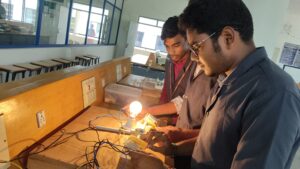
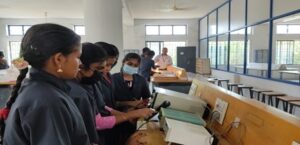
DIGITAL ELECTRONICS LABORATORY
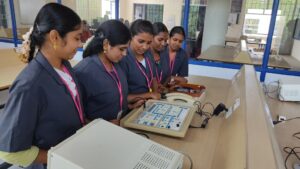
With a view of inculcating knowledge in fundamentals of Digital Electronics, this Laboratory is furnished with basic electronic hardware components. Through performing experiments such as Logic gates, Multiplexers, Demultiplexers, Encoders, Decoders, Flip-flops, Registers, Synchronous and Asynchronous Counters, the students are made familiar with the basic operations of Digital networks and Mini-computers. Each standard setup in this laboratory has basic Trainer kits and IC Testers. Hardware Description Language (VHDL) is used extensively for design, simulation and verification
DIGITAL SIGNAL PROCESSING & VLSI LABORATORY
Digital Signal Processing Laboratory (DSP) is concerned with the representation of signals as a sequence of numbers and the operations carried out on the signals to extract specific information contained in them. The objective of the laboratory is to enable the students to simulate and experiment with digital signals and systems. Students can implement digital signal processing algorithms using different computational platforms and DSP tools which enhance the practical exposures in signal processing.
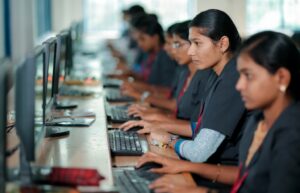
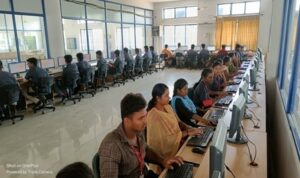
MICROPROCESSOR AND MICROCONTROLLER LABORATORY
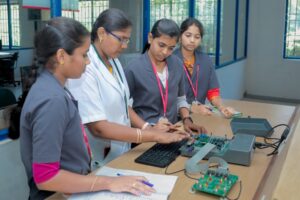
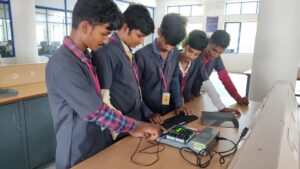
This Laboratory is equipped with Microprocessor Trainer kits based on INTEL 8085, 8086 and Microcontroller kits based on INTEL 8051, 8059 along with interfacing peripheral devices such as 8279, 8251 and 8253. Added to this, Microprocessor based Speed control of Motors, PC based Temperature Control system, Data Acquisition system with software facilities has been established and Cross Assembler experiments are carried out.
OPTICAL & ANALOG AND DIGITAL COMMUNICATION LABORATORY
The Laboratory provides depth knowledge about the Optical and Microwave components and analyzing the Optical and microwave Equipments. The Students are able to learn the concepts of how to communicate and to do transmission between Microwave devices. This laboratory helps the students to design, analysis, optimization and characterization of miniaturized RF and Microwave components and devices based on new breakthroughs in microwave theory and techniques. The students to know and understand how communication is being established at microwave frequencies and using fiber in Optical Communication. The first half of the course uses Optical bench setup. The second half of the course uses Microwave bench setup.
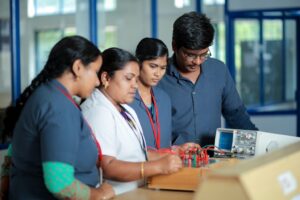
INCUBATION CENTRE
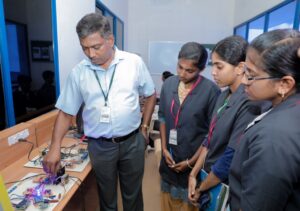
The incubation centre will focus primarily on encouraging research and ideation from the students. The Incubation centre will support with the concept validation and prototype creation for ideas being worked upon by the students. It is equipped with various platforms such as Printed Circuit Board design, Arduino boards, and Raspberry Pi boards, various sensors and interface modules. Through this technical incubation centre, students make their innovation as prototype; they exhibit their prototype in project contest and events conducted by various institutions.
IETE-The Institution of Electronics and Telecommunication Engineers
The Institution of Electronics and Telecommunication Engineers (IETE) is India’s leading recognised professional society devoted to the advancement of Science and Technology of Electronics, Telecommunication & IT. Founded in 1953. The IETE is the National Apex Professional body of Electronics and Telecommunication, Computer Science and IT Professionals.
It serves more than 1,25,000 members (including Corporate, Student and ISF members) through various 63 Centres, spread all over India and abroad. The Institution provides leadership in Scientific and Technical areas of direct importance to the national development and economy. Government of India has recognised IETE as a Scientific and Industrial Research Organization (SIRO) and also notified as an educational Institution of national eminence.
The objectives of IETE focus on advancing electro-technology. The IETE conducts and sponsors technical meetings, conferences, symposia, and exhibitions all over India, publishes technical journals and provides continuing education as well as career advancement opportunities to its members.
The IETE focuses on advancement of the Science and Technology of Electronics, Telecommunication, Computers, Information Technology and related areas. Towards this end the Institution promotes and conducts basic engineering and continuing technical education programmes for human resource development.
OBJECTIVES
- Financial Support: Institutions receive grants based on membership strength to conduct various activities.
- Access to Publications: Chapters receive IETE’s technical publications, including journals and newsletters, enhancing the knowledge base of students
- Technical Events: Opportunity to organize and participate in workshops, seminars, and conferences, fostering a culture of continuous learning.
- Networking: Connect with professionals, academicians, and peers through IETE’s extensive network.
- Career Advancement: Enhance your resume and gain recognition in the professional community.
FUNCTIONS
- Workshops and Seminars: On emerging technologies and industry trends.
- Technical Competitions: Including quizzes, coding contests, and project exhibitions.
- Guest Lectures: By industry experts and academicians.
- Industrial Visits: To provide practical exposure to students.
- Research and Development: Encouraging students to undertake innovative projects.
REPORTS
Faculty Publications
Students Achievements
Incubation Centre
Students Achievements
Magazine & News Letter
Technical Magazine
News Letter
Awards and Achievements
| Award Name | Faculty | Year | Gallery |
|---|---|---|---|
| Excellence Teaching in Higher Education | Mr.R.S.Kamalakannan | 2015-2016 | Click Here |



